Congressman Mark Takano, the ranking member of the House Veterans Affairs Committee, brought together on July 9, 2025, more than fourteen (14) veteran service organizations to discuss the military’s occupational health support.
The veteran organizations participating in the round table said the military isn’t doing enough to prevent long-term health effects tied to toxins and other risks troops are exposed to during their time in the military.
The veteran organizations called for reforms in the existing toxic exposure laws and indicated that the 2022 PACT Act needed to be upgraded.
“You all know, as I do, that the PACT Act was not comprehensive,” said Congressman Takano. “It was not meant to be one-and-done. It was a down payment. And there are significant populations that still need help. Those populations are no less worthy than those who were included in the bill.”
“As the medical appointments stack up, as the diagnoses stack up, as the deaths stack up, we must further our efforts to address toxic exposures in the domestic sphere and push back against the idea that our service members are only in harm’s way in war zones,” he summarized.
“I am proud of the work we did on the PACT Act, but we’re far from finished,” Congressman Takano stated.
According to Lieutenant Colonel (LTC) Jacob Berry, the Department of Veterans Affairs (VA) needs to respond to the growing number of cases of service members who are experiencing a wide range of issues.
All these issues relate to chemicals and carcinogens leading to infertility and illness, as well as those harmed by traumatic brain injury and radiation while serving in the military.
“We have the data,” LTC Berry said. “We have the science. We have the technology. What we need now is the WILL. We’ve built a military system capable of defeating enemies abroad. Now is our opportunity to build one capable of protecting those who serve.”
One problem facing troops is that there are often few occupational health specialists placed in highly sensitive or classified jobs in the military, Berry emphasized, which opens up more risks.
A specific example of this is the growing diagnoses of cancer among troops who work at America’s nuclear intercontinental ballistic missile bases.
Military.com detailed those growing concerns in an investigative series last year, as well as the warnings that went ignored for two decades. Some reforms to occupational health records have followed amid an ongoing Air Force Cancer Study.
A recent independent health study examining diagnoses of non-Hodgkin lymphoma among those who served at Malmstrom Air Force Base, Montana, found that service members were diagnosed at younger ages compared to the wider population.
The Torchlight Initiative, a veterans advocacy organization whose members served within the Nation’s Intercontinental Ballistic Missile Arsenal, spoke to Congressman Takano at the July 9, 2025, meeting.
They spoke on the large numbers of cancer diagnoses among veterans who served at stateside bases where “toxic exposure and contact with contaminants was widespread.”
The Torchlight Initiative has a cancer registry on its website. As of December 2024, more than 700 cases of cancer and illnesses were reported among veterans whose service involved missiles.
Another organization, The Invisible Enemy, advocates for veterans exposed to radiation at the Nevada Test and Training Range. These veterans were exposed to radiation not only through the nature of their jobs, but just by living in those areas. One member’s barracks was just two miles from a nuclear detonation site.
“Exposure isn’t the acute exposure that you got from sitting there watching the glass,” The member said. “It’s what you get from breathing the air, crawling in the dirt, drinking the water, and the issues manifest themselves 20 to 30 years later.”
Several of the organizations asked Congress to consider legislation “that would notify veterans, who may have been exposed to toxins at foreign and domestic bases.” Others organizations asked for “studies to prove there are high rates of cancer in certain military communities.”
Other organizations asked “for the same benefits that have been extended through the PACT Act and other laws to other veterans exposed to toxins.”
“These conversations are not easy. They are not fun. But they are necessary,” Representative Takano said. “They are especially necessary right now in this time of great uncertainty for the Department of Veterans Affairs.”
My Opinion: Many veterans, who are not receiving PACT Act benefits and compensation, are feeling forgotten, discounted, ignored, and dismissed.
Vietnam veterans remember the battles it took to get Congress and the VA to recognize Exposure to Agent Orange. How many years passed before Congress finally recognized and passed the Blue Water Navy Act?
For Iraqi and Afghanistan veterans, how many years expired before the PACT Act was passed, which addressed the toxins of the Open Burn Pits?
Senator and disabled Army Veteran Tammy Duckworth stated to over 5,000 veterans on June 6, 2025: “You deserve better; you’ve earned better!”
She is right! These veterans deserve better because they earned better!
BioSketch: John Plahovinsak is a retired 32-year Army veteran who served from 1967 to 1999. He is the Disabled American Veterans (DAV) Department of Ohio’s Hospital Chairman and Adjutant of Chapter #63 (Clermont County). He can be contacted at: [email protected].
Subscribe to The Clermont Sun today!
https://www.clermontsun.com/subscribe

